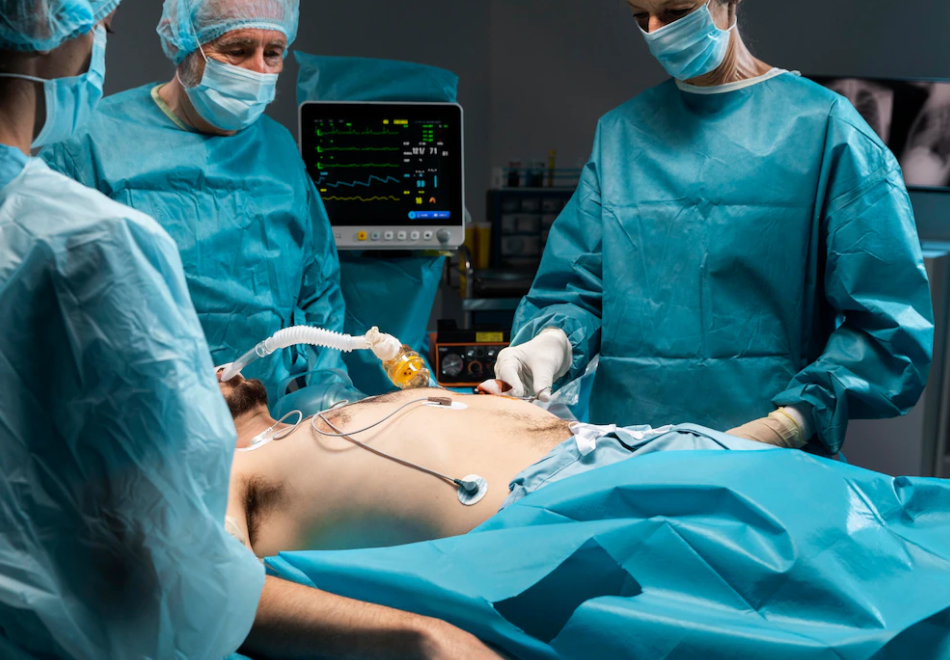General and Laproscopic Surgeon

Welcome to Galaxy Hospital’s General and Laparoscopic Surgery Department
At Galaxy Hospital, we pride ourselves on offering the highest standard of care through our General and Laparoscopic Surgery Department. Our team of experienced surgeons and healthcare professionals is dedicated to providing advanced, minimally invasive surgical options to treat a wide range of conditions, ensuring quicker recovery times, reduced pain, and minimal scarring for our patients.
About Our Treatment
Our General and Laparoscopic Surgery services are designed to diagnose, manage, and treat a variety of conditions that affect the abdomen, digestive tract, gallbladder, hernias, and other areas requiring surgical intervention. Laparoscopic surgery, also known as minimally invasive surgery, involves the use of a laparoscope—a thin, flexible tube with a camera and light at the end—to view the inside of the abdomen and perform surgery through small incisions.
This advanced technique offers numerous benefits over traditional open surgery, including shorter hospital stays, less postoperative pain, faster recovery, and smaller scars. At Galaxy Hospital, we utilize the latest in laparoscopic technology and surgical practices to ensure our patients receive the best possible outcomes.
Common Conditions Treated
Our General and Laparoscopic Surgery Department treats a variety of conditions, including but not limited to:
- Gallbladder Disease
- Causes: Gallstones, inflammation, and infection can cause significant pain and complications.
- Symptoms: Abdominal pain, nausea, vomiting, and jaundice.
- Treatment: Laparoscopic cholecystectomy, a minimally invasive procedure to remove the gallbladder.
- Hernias
- Causes: Weak spots in the abdominal wall or groin, often exacerbated by heavy lifting or strain.
- Symptoms: A noticeable bulge, discomfort, pain, especially when bending or lifting.
- Treatment: Laparoscopic hernia repair, offering quicker recovery and less postoperative pain compared to open surgery.
- Appendicitis
- Causes: Inflammation of the appendix, often due to infection.
- Symptoms: Severe abdominal pain, particularly in the lower right quadrant, fever, and nausea.
- Treatment: Laparoscopic appendectomy, allowing for quicker recovery and less postoperative discomfort.
- Gastroesophageal Reflux Disease (GERD)
- Causes: Malfunction of the lower esophageal sphincter, leading to acid reflux.
- Symptoms: Heartburn, regurgitation, chest pain, and difficulty swallowing.
- Treatment: Laparoscopic fundoplication, a procedure that reinforces the lower esophageal sphincter to prevent acid reflux.
- Diverticulitis
- Causes: Inflammation or infection of small pouches (diverticula) in the digestive tract.
- Symptoms: Abdominal pain, fever, and changes in bowel habits.
- Treatment: In severe cases, laparoscopic surgery may be required to remove the affected portion of the colon.
Symptoms and Diagnosis
Understanding the symptoms associated with these conditions is crucial for early detection and treatment. Common symptoms that may indicate the need for general or laparoscopic surgery include:
- Persistent abdominal pain
- Unexplained weight loss
- Bloating and gas
- Difficulty swallowing
- Persistent heartburn or acid reflux
- Nausea and vomiting
- Changes in bowel habits, such as diarrhea or constipation
- Visible bulging in the abdomen or groin (in case of hernias)
If you are experiencing any of these symptoms, it is important to seek medical evaluation. Our team at Galaxy Hospital will conduct a thorough examination, which may include diagnostic imaging such as ultrasound, CT scans, or endoscopy, to accurately diagnose your condition.
Treatment Options
At Galaxy Hospital, we prioritize patient-centered care, tailoring our surgical treatments to meet the specific needs of each patient. Our approach to treatment includes:
- Laparoscopic Surgery: This minimally invasive technique is our preferred method for many conditions. It offers numerous benefits, including reduced postoperative pain, shorter recovery times, and smaller scars.
- Traditional Surgery: In cases where laparoscopic surgery is not feasible, we are fully equipped to perform traditional open surgeries with the same level of precision and care.
- Preoperative and Postoperative Care: Our comprehensive care does not end with surgery. We provide detailed preoperative instructions and postoperative care plans to ensure a smooth recovery. This includes pain management, wound care, dietary advice, and follow-up appointments.
Frequently Asked Questions (FAQs)
Q1: What is the difference between laparoscopic surgery and traditional surgery?
A: Laparoscopic surgery is a minimally invasive technique that uses small incisions and a laparoscope to perform surgery. Traditional surgery, also known as open surgery, involves larger incisions to directly access the area of concern. Laparoscopic surgery generally offers faster recovery, less pain, and smaller scars.
Q2: Is laparoscopic surgery safe?
A: Yes, laparoscopic surgery is considered safe and effective for many conditions. It is associated with lower risks of complications compared to traditional surgery. However, like any surgery, it carries some risks, and your surgeon will discuss these with you before the procedure.
Q3: How long is the recovery period after laparoscopic surgery?
A: Recovery time varies depending on the procedure and the patient’s overall health. Most patients can return to normal activities within a week or two, although full recovery may take longer for more complex surgeries.
Q4: Will I have visible scars after laparoscopic surgery?
A: Laparoscopic surgery typically results in very small scars, usually less than an inch long. These scars tend to fade over time and are often barely noticeable.

